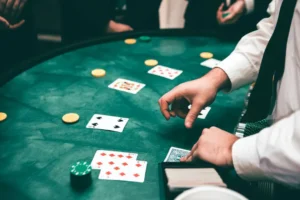Legalization of physical casinos may be voted on this year; understand

Written by :
Heloisa Vasconcelos

Law No. 14,790, which regulated fixed-odds betting in Brazil at the end of last year, also brought the release for online casinos, operated by bookmakers.
For now, operating this type of game in physical establishments is still considered a crime under Brazilian law.
However, experts expect that bills dealing with the legalization of the activity may advance in legislative houses this year.
Today, three bills aim to legalize land-based casinos in Brazil; one is being processed in the Chamber of Deputies and the other two in the Federal Senate. Bill No. 442, which is being processed in the Chamber, dates back to 1991.
Casinos are banned under the Misdemeanors Act of 1941, as were sports betting until 2018. The legislation prohibits gambling as it is considered an offence against the police.
The debate over the legalization of gambling comes from the economic potential of the activity. In the United States, for example, gambling revenue exceeded US$60 billion (R$315 billion) in 2022, according to the latest report from the American Gaming Association (AGA).
Against morals and good customs
Camila Fernandes Oliveira, a partner at Nelson Wilians Advogados, explains that the ban on gambling is largely driven by the problem of gambling addiction, which is considered an issue against morality and good customs.
According to her, today there is a different view of the legislature, observing the economic, tourist and job creation potential of physical casinos.
![]()
“ We cannot close our eyes to the fact that games are part of Brazilian reality, they are just not taxed or publicized, and this regulation can help provide protection and income for players. ”
Camila FernandesPartner at Nelson Willians Advogados
She believes that there should be movement in PL 2,234 and PL 2,648, which deal with the topic, later this year, driven by the regulation of online betting and casinos.
“Based on the rules we are seeing in these bills, they are always aimed at installing these complexes in places where we have leisure complexes, resorts, and tourist heritage. There is enormous potential for development in these regions of Brazil,” he argues.
Movements in recent years
The three projects that are currently being processed, PL 2,234 , PL 2,648 and PL 442 , have undergone significant changes in recent years, having been approved by committees in the Senate and the Chamber of Deputies.
Bill 442 was approved by the Chamber in 2022, being sent to the Senate, but there was no new movement after that.
Senator Angelo Coronel, who was the rapporteur for the gambling regulation project, also reports on a project linked to the legalization of casinos.
He hopes that the projects that are in the Senate will be put on the agenda this year, with emphasis on PL 2.648, which he reports on in the Regional Development and Tourism Committee.
“I believe that parliamentarians realized that we need to advance this agenda and look at it as a regular economic activity, and not as an agenda of customs with only moral aspects,” he says.
What would casinos in Brazil be like?
Marcelo Mattoso, partner at Barcellos Tucunduva Advogados (BTLAW) and specialist in the Gaming, Games and eSports Market, states that the most advanced project today is PL 2,648, reported by Senator Angelo Coronel.
The project introduces rules for the operation of casinos in “resorts”, integrated leisure complexes. The project allows operation only for a specific period and only for expressly authorized games, including virtual games.
![]()
“ There is a division of the number of casinos per state, the states with more inhabitants can have more casinos. Casinos on maritime vessels are also approved. ”
Marcelo MattosoPartner at Barcellos Tucunduva Advogados (BTLAW) and specialist in the Gaming Market, Games and eSports
The legislation is responsible for deciding where casinos should be installed, prioritizing regions with greater tourist potential and lower Human Development Indexes (HDI), aiming to generate resources for these areas.
Economic potential
Mattoso highlights the economic potential of the initiative.
“Once this is regulated, there are jobs and taxes can be collected. I always look favorably on it as it helps the sector,” he says.
Senator Angelo Coronel estimates that gambling could add around R$50 billion annually to public coffers.
“For example, there is a prospect that the installation of so-called integrated resorts in Brazil would double the number of foreign tourists in five years, from 6 million to 12 million. There is also talk of investments in the order of R$44 billion and the creation of 200,000 jobs,” he says.
